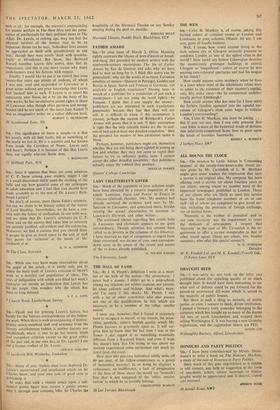FATHER AMARO
SIR,—In your issue of March 2, Olivia Manning rightly contrasts the 'choice of hors-d'oeuvre or bread- and-marg' diet provided by modern writers with the nineteenth-century masterpiece The Sin of Father Amaro by Eva de Queiroz and asks why we have had to wait so long for it. I think this query can be generalised: why are the works of so many European novelists of stature—Queiroz in Portugal, Galdos and Baroja in Spain, Storm and Fontane in Germany, not available in English translation? Having been in search of a publisher for a translation of just such a masterpiece—I am not using the word lightly—by Fontane, I think that I can supply the answer: publishers are not interested in such translations, presumably because they fear that they will not sell. It is difficult to know if this assumption is correct; perhaps the success of Reinhardt's Father Amaro will prove that it is not. 'f their assumption is right that the only saleable books ate the 'in-and- out-of-bed-and-at-least-one-detailed-copulation,' then the prospect for readers of less adolescent tastes is bleak.
Perhaps, however, publishers might ask themselves whether they are not being short-sighted in aiming so low and whether they may not come to regret their failure to try to influence public taste. I cannot accept the other dreadful possibility: that publishers actually enjoy the rubbish they produce.
DOUGLAS PARMtE
Queens' College, Cambridge


































 Previous page
Previous page